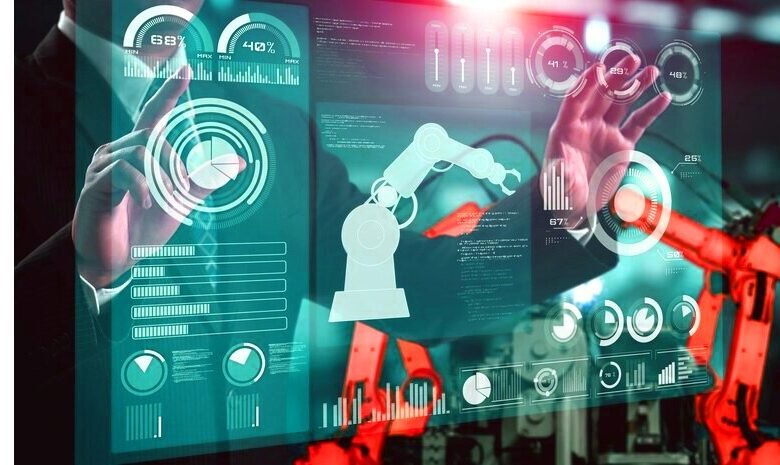The Impact of Automation on Labor: Challenges and Opportunities Ahead

Automation, integrating technology and machinery to perform tasks traditionally carried out by humans, marks a significant shift in the labour landscape. This transformation, fueled by advancements in robotics, artificial intelligence (AI), and machine learning, is reshaping industries across the globe. From manufacturing and agriculture to healthcare and finance, automation is revolutionizing how work is done.
The Evolution of Labor
Throughout history, labour has been central to economic activity. From the agrarian age to the Industrial Revolution, human effort has been the driving force behind productivity and growth. However, the emergence of automation represents a fundamental shift in this paradigm. As machines become increasingly capable of performing complex tasks, the nature of work undergoes profound changes. Traditional roles are redefined, and new opportunities arise, challenging conventional notions of employment.
Challenges Posed by Automation
Despite its potential benefits, automation presents several challenges to the labour force. Job displacement is a primary concern, as machines replace human workers in routine and repetitive tasks. This displacement can lead to unemployment and economic hardship for individuals and communities reliant on traditional industries. Moreover, the skills gap between the jobs lost to automation and those created in emerging fields exacerbates inequality, widening the socioeconomic divide.
Opportunities in the Age of Automation
While automation disrupts established industries, it also creates opportunities for innovation and growth. Automated systems improve efficiency and productivity, enabling businesses to deliver higher-quality goods and services at lower costs. Additionally, automation generates demand for skilled workers proficient in areas such as programming, data analysis, and robotics maintenance. These new opportunities pave the way for economic diversification and workforce development.
Social and Cultural Implications
Beyond its economic impact, automation has far-reaching social and cultural implications. As machines assume tasks once performed by humans, questions arise about the value of work and its role in society. Work-life balance becomes increasingly important as automation blurs the boundaries between professional and personal life. Moreover, the rise of AI and automation prompts discussions about the ethical implications of delegating decision-making to machines, raising concerns about accountability and transparency.
Government and Policy Response
Addressing the challenges of automation requires proactive government intervention and policy initiatives. Regulation and oversight are essential to ensure that automation is deployed responsibly and ethically. Additionally, governments must invest in education and training programs to equip workers with the skills needed to thrive in an automated world. Policies promoting lifelong learning and reskilling empower individuals to adapt to changing job requirements and remain competitive in the labour market.
Read More: Effective Employee Management: Strategies for Maximizing Productivity
Global Perspectives on Automation
The impact of automation varies across different regions and cultures, reflecting disparities in technological adoption, workforce readiness, and policy frameworks. While some countries embrace automation as a catalyst for economic development and competitiveness, others approach it with caution, mindful of its potential social and economic consequences. International cooperation and knowledge-sharing are vital in addressing common challenges and maximizing the benefits of automation on a global scale.
Case Studies and Examples
Examining case studies and real-world examples provides valuable insights into the diverse applications and implications of automation across industries. From the automotive sector’s use of robotics in manufacturing to the healthcare industry’s adoption of AI-driven diagnostics, these examples highlight the transformative power of automation and its potential to revolutionize entire sectors.
Preparing for the Future of Work
Preparing for the future of work requires a proactive approach to skills development and adaptation. Individuals must embrace lifelong learning and continuously update their skills to remain relevant in a rapidly evolving job market. Employers play a crucial role in supporting workforce development through training programs and upskilling initiatives. By fostering a culture of innovation and adaptability, organizations can navigate the challenges of automation and thrive in the digital age.
Ethical Considerations
As automation becomes increasingly integrated into society, ethical considerations loom large. Ensuring fairness, equity, and transparency in the deployment of automated systems is essential to mitigate the risk of bias and discrimination. Moreover, ethical frameworks must address broader questions about the impact of automation on human dignity, autonomy, and well-being. By prioritizing ethical principles in the design and implementation of automation technologies, we can build a more inclusive and equitable future for all.
Balancing Automation and Human Labor
Achieving a balance between automation and human labour is critical to maximizing the benefits of technological advancements while preserving the dignity and rights of workers. Rather than viewing automation as a threat to jobs, society must embrace a collaborative approach that leverages the unique strengths of both humans and machines. By focusing on tasks that require creativity, empathy, and critical thinking, humans can complement automated systems and contribute to a more harmonious and productive work environment.
Environmental Sustainability
Automation has the potential to drive environmental sustainability by optimizing resource usage and reducing waste. From energy-efficient manufacturing processes to smart transportation systems, automated technologies offer innovative solutions to pressing environmental challenges. By promoting the adoption of green technologies and sustainable practices, automation can play a vital role in building a more resilient and eco-friendly future.
Redefining Success in the Automation Era
In the automation era, success goes beyond traditional metrics such as GDP growth and profit margins. A holistic approach to prosperity considers factors such as well-being, happiness, and environmental stewardship. By redefining success in terms of human flourishing and sustainable development, we can create a future where automation serves as a tool for social progress and collective well-being.
Future Trends and Predictions
Looking ahead, the pace of automation shows no signs of slowing down. Advances in AI, robotics, and automation technologies promise to revolutionize industries and transform the way we live and work. However, navigating the uncertainties of an automated future requires foresight, adaptability, and a commitment to human-centric values. By embracing innovation and embracing change, we can harness the transformative power of automation to build a more prosperous, equitable, and sustainable world for future generations.
Read More: The Gig Economy: Redefining Employment in the Digital Age
Conclusion
In conclusion, the impact of automation on labour presents both challenges and opportunities for society. By addressing the ethical, social, and economic dimensions of automation, we can ensure that technological advancements benefit all members of society. Through proactive government policies, investment in education and training, and a commitment to ethical principles, we can navigate the complexities of the automation era and build a future where humans and machines coexist harmoniously, driving innovation, productivity, and prosperity.
FAQs
How does automation affect job creation?
Automation can both eliminate and create jobs, depending on the industry and the nature of the tasks involved. While some roles may become obsolete, new opportunities emerge in fields such as technology, data analysis, and robotics maintenance.
What measures can governments take to mitigate the negative effects of automation on labour?
Governments can implement policies such as retraining programs, job placement assistance, and social safety nets to support workers affected by automation. Additionally, investing in education and promoting entrepreneurship can help foster innovation and create new economic opportunities.
Are there any industries immune to automation?
While automation has the potential to impact all industries to some extent, sectors that require high levels of creativity, empathy, and human interaction, such as healthcare, education, and the arts, are less susceptible to full automation.
How can individuals prepare themselves for the changing demands of the labour market?
Individuals can prepare for the future of work by acquiring in-demand skills, pursuing lifelong learning opportunities, and cultivating adaptability and resilience. Embracing technology and staying abreast of industry trends can also enhance employability in an evolving job market.
What role does education play in ensuring a smooth transition to an automated workforce?
Education plays a crucial role in equipping individuals with the skills needed to thrive in an automated workforce. By fostering critical thinking, problem-solving abilities, and digital literacy, education prepares individuals to navigate the complexities of the modern workplace and contribute to innovation and productivity.











